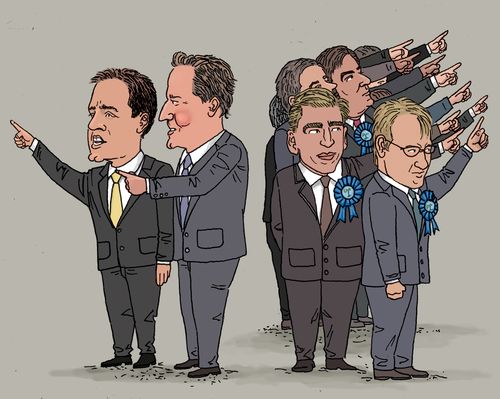
‘Conservatives need to recast the argument about free enterprise for a new age, or risk losing the debate to a tide of anti-market socialisation.’ Elizabeth Truss MP
David Cameron’s first major Cabinet reshuffle since becoming Prime Minister in May 2010 was accused or hailed as signifying a ‘shift to the right’. The bruiser of the Tory Left Kenneth Clarke was replaced at the Ministry of Justice by Chris Grayling, a darling of the Tory Right. Matthew Hancock and Michael Fallon, two unabashed Thatcherites, have been installed as Business ministers whose primary purpose is to restrain the egalitarian and regulatory urges of Vince Cable. Other signals that the Coalition has moved to the ideological Right bear witness with the promotion of Jeremy Hunt to Health, Owen Patterson to Environment and Maria Miller at Culture. The notion that the reshuffle signified an ideological dalliance with the Right was the consensus of the respectable press. The defenestration of Tory moderates such as George Young, Sayeeda Warsi and Clarke with Tory hardliners such as Grayling, Patterson and Theresa Villiers was evidence of this.
There are two considerations which contribute reservation to the claim that the reshuffle marks a shift to the Right and, consequently, will have an effect on the policy agenda of the government however. Firstly, the Tories are in Coalition and are, willy nilly, straitjacketed by the Coalition Agreement with the Liberal Democrats. Secondly, Cameron has stated that the change in personnel will not trigger a change in policy. The Prime Minister’s spokesman said, ‘This is a reshuffle, it doesn’t mean a change in government policy. It means different people in different jobs, but the policy remains the same.’ It was, as the PM’s spokesman said again, a demonstration that the government was moving to the ‘delivery phase’ of government. Danny Finkelstein, The Times columnist, outlined the meaning/justification of the Cabinet reshuffle in a similar vein by suggesting you might want a division of labour between ‘introducing’ and ‘implementing’ reforms.
Importantly, there is no change of macro-economic policy, which is the raison d’etre of the Coalition Government. The Osborne Treasury and the Government in toto remain wedded to ‘Plan A’: to eliminate the structural deficit at an accelerated pace with an unbalanced mixture of spending reductions (80%) and tax increases (20%). Even Vince Cable, the bete noire of the Conservatives, told Radio 4’s World this Weekend: ‘There is no Plan A, B, C or V which provides an alternative’. Osborne reaffirmed this by declaring that ‘there is no alternative’ to the plan laid out in the Spending Review of October 2010. The Government’s reluctance to change economic policy is based on a historical reading of government failure: the Wilson Government split over devaluation in the late 1960s; the Heath Government divided over Heath’s U-turn after unemployment exceeded one million in 1972; and the Thatcher Government in the first term was riven between the ‘wets’ and ‘dries’ on Geoffrey Howe’s 1981 Budget. There is therefore little substantive change to the overall ideological character, behaviour and intent of the Coalition Government. Nevertheless, the reshuffle does signify an important long-term trend and development in the Conservative Party and the trajectory of Tory ideology however: an inexorable move to the Right.
The move to the Right in the Conservative Party is a long-term trend that dates back to the 1960s. However, the resurgent confidence of the Tory Right, both intellectually and personally, is centrally attributable to the ‘class of 2010’. Admittedly, the old Right has its reliable and powerful stalwarts in politicians such as Peter Lilley, John Redwood and David Davis. Nevertheless, the ‘class of 2010’ are using a radical rhetoric to give intellectual respectability to what the Tory Party has always wanted. Their inspiration is the Thatcherite insurgency in the mid-to-late 1970s, when the radical free market Toryism of Mrs Thatcher replaced the moderate One Nation Conservatism of Edward Heath.
So, who are the this new Tory Right and what do they stand for? They are disparate collection of Conservative MPs, of whom the most interesting, influential and ideologically-coherent group is the ‘class of 2010’, which includes Kwasi Kwarteng, Priti Patel, Dominic Raab, Chris Skidmore and Liz Truss. They are, if you like, the new New Right! They, like the old New Right, have an important and easily decodable ideological prognosis for the future. In Britannia Unchained: Global Lessons for Growth and Prosperity, the new New Right skate around the world looking for examples of approaches that will help Britain bring growth to the sluggish economy, reform the education system, boost social mobility and social justice and abolish the slide into mediocrity.  Raab argued for, in The Future of Conservatism: Values Revisited, a further round of trade union reform arguing that ‘Luddite union leaders’ block vital reforms needed to boost UK economic competitiveness. Furthermore, and something which Francis Maude in the Cabinet Office is considering, Raab recommends that the government should not subsidise the unions by paying staff for working full or part-time on union activities. In addition, Raab advises the government to make illegal strike action in the emergency services and transport unions. One of the most controversial elements of the book is their condemnation of the British work ethic as ‘idle’. Raab states, ‘The British are among the worst idlers in the world. We work among the lowest hours, we retire early and our productivity is poor.’ The only way to resolve this, for the new New Right, is to liberalise labour laws and have a bonfire of regulations. Adrian Beecroft, asked by the government to produce a report looking into employment law, recommended extending the time people had to work for a company before they could claim unfair dismissal from one year to two; limitations on the request for flexible working; watering down of the ‘Tupe’ rules and scrapping plans for equal pay audits among others. Too fragile are the Tories and too combustive are the reforms to implement the Beecroft proposals while in coalition with the Liberal Democrats, but the Tory Right and the Free Enterprise Group have expressed agreement and enthusiasm for the proposals.
Raab argued for, in The Future of Conservatism: Values Revisited, a further round of trade union reform arguing that ‘Luddite union leaders’ block vital reforms needed to boost UK economic competitiveness. Furthermore, and something which Francis Maude in the Cabinet Office is considering, Raab recommends that the government should not subsidise the unions by paying staff for working full or part-time on union activities. In addition, Raab advises the government to make illegal strike action in the emergency services and transport unions. One of the most controversial elements of the book is their condemnation of the British work ethic as ‘idle’. Raab states, ‘The British are among the worst idlers in the world. We work among the lowest hours, we retire early and our productivity is poor.’ The only way to resolve this, for the new New Right, is to liberalise labour laws and have a bonfire of regulations. Adrian Beecroft, asked by the government to produce a report looking into employment law, recommended extending the time people had to work for a company before they could claim unfair dismissal from one year to two; limitations on the request for flexible working; watering down of the ‘Tupe’ rules and scrapping plans for equal pay audits among others. Too fragile are the Tories and too combustive are the reforms to implement the Beecroft proposals while in coalition with the Liberal Democrats, but the Tory Right and the Free Enterprise Group have expressed agreement and enthusiasm for the proposals.
Nevertheless, there is a fog of desperation in the prophecy of a ‘lost decade’ if the Tories don’t adopt their prescription. The prophecy is one rooted in the the politics of the 1970s. The Tory Right see a homology between the politics of the 1970s and the politics of the 2010s. The Heath Government, like Cameron’s Conservative-led Coalition Government, was tinged with the blight of slow growth, rising unemployment and soaring bankruptcies. The ‘lost decade’ of low growth, high (youth) unemployment and growing tensions between different groups in society, which will engulf both Cameron and Ed Miliband – if Miliband wins the 2015 General Election, which opinion polls consistently point to – is said to mirror the politics of the 1970s. The Heath Government failed to implement its ‘Selsdon’ platform, which in many ways was proto-Thatcherite. Heath went onto to lose two elections in February and October of 1974 to the Harold Wilson and Labour governed for the next five years presiding over industrial strife, inexorable decline, class conflict, an IMF-bailout and the ‘winter of discontent’. The Thatcherite Right (and the Bennite Left) in the early 1980s saw the 1970s as a ‘lost decade’ and a ‘decade of failure’. The Tory Right believe that this is what they may see when looking back at the 2010s from the perspective of a Tory government in the 2020s: a failed Tory-led government, an inept Labour administration and then a resurgent radical Toryism that will rescue the nation from the quagmire of decline and depression. As Andy Beckett stated, ‘If history repeats, which it rarely does exactly, we should expect the Unchaining of Britannia to commence in 2019.’ Nevertheless, as Mark Twain reminds us, ‘history does not repeat itself, but it does rhyme.’
In conclusion, the Conservative Party should be weary and cautious about this explicitly perceptible drift to the Right. It further entrenches the Party’s association with what critics call ‘market fundamentalism’. It further uproots the noble, if not completely successful, efforts of the Cameronites to rebalance the core of Conservatism: a complex marriage between communities/the primacy of cultural norms and the free market economy. There is a long, academic and sometimes laborious debate about whether these two objectives are compatible.  David Willetts in the 1990s, preempting Cameron by about ten years, argued consummately that there was no contradiction between a synthesis of free markets and settled communities. Instead of blaming the market economy for the enervation and destruction of communities, Willetts argued that critics should look at the ‘moral nihilism’ of the 1960s. This is in keeping with the Thatcherite critique of the 1960s as destroying what Mrs Thatcher called the ‘personal society’. John Gray, the British political philosopher, argued that there was a ‘crisis of conservatism’ insofar as the ‘Hayekian polity’ and ‘market fundamentalism’ of the Thatcher-Major years had destroyed ‘conservatism as a viable political project’.
David Willetts in the 1990s, preempting Cameron by about ten years, argued consummately that there was no contradiction between a synthesis of free markets and settled communities. Instead of blaming the market economy for the enervation and destruction of communities, Willetts argued that critics should look at the ‘moral nihilism’ of the 1960s. This is in keeping with the Thatcherite critique of the 1960s as destroying what Mrs Thatcher called the ‘personal society’. John Gray, the British political philosopher, argued that there was a ‘crisis of conservatism’ insofar as the ‘Hayekian polity’ and ‘market fundamentalism’ of the Thatcher-Major years had destroyed ‘conservatism as a viable political project’.  The hyper-charged economic growth and concomitant liquidation or reduction of the institutions that held together British society had, according to Gray, pushed Britain to insuperable social and ecological limits. Cameron’s response to this ostensible impasse of Conservatism was to deny the apparent aporia. He squared the circle by arguing that the Conservatives’ core belief was in the Big Society: a smaller state, a responsible citizenry and a localised, remoralised market economy. The politics of austerity has tested this ideological synthesis to destruction. The Big Society has disappeared from the Cameron’s political vocabulary. It has given way to a narrow economism, which is less concerned with societal norms and more interested in restoring growth. Moreover, the Cameronites are being outflanked intellectually by a resurgent Tory Right that has little time for the rhetoric or practice of Big Society Cameronism. Less than a year ago the Tory Right collaborated on a book, After the Coalition: A Conservative Agenda for Britain, which was broadly complementary to the Cameronite vision of Britain. It was not a book propounding Thatcherite, Eurosceptic views. Instead it espoused authentically post-Lehman Brothers Cameronite thinking; namely, fiscal and welfare responsibility. The book, if anything, demonstrated that the Tory Party had been made in Cameron’s image. However, in September 2012 the same Tory Right in Britannia Unchained had a much changed agenda. These influential members of the ‘class of 2010’ accuse British workers of being ‘among the worst idlers in the world’. They argue further for a change in economic policy. Not the neo-Keynesian alternative proffered by the Labour Party, but an economic strategy that included pro-growth initiatives including reform of the labour market, tax cuts and other ‘supply-side’ measures needed to boost competitiveness. The change in rhetoric and ideological emphasis is due, in part, to a change in the circumstances and increase in the budget deficit. In the first four months of the current fiscal year the deficit widened to £44.9 billion compared to £35.6 billion in the same period last year.
The hyper-charged economic growth and concomitant liquidation or reduction of the institutions that held together British society had, according to Gray, pushed Britain to insuperable social and ecological limits. Cameron’s response to this ostensible impasse of Conservatism was to deny the apparent aporia. He squared the circle by arguing that the Conservatives’ core belief was in the Big Society: a smaller state, a responsible citizenry and a localised, remoralised market economy. The politics of austerity has tested this ideological synthesis to destruction. The Big Society has disappeared from the Cameron’s political vocabulary. It has given way to a narrow economism, which is less concerned with societal norms and more interested in restoring growth. Moreover, the Cameronites are being outflanked intellectually by a resurgent Tory Right that has little time for the rhetoric or practice of Big Society Cameronism. Less than a year ago the Tory Right collaborated on a book, After the Coalition: A Conservative Agenda for Britain, which was broadly complementary to the Cameronite vision of Britain. It was not a book propounding Thatcherite, Eurosceptic views. Instead it espoused authentically post-Lehman Brothers Cameronite thinking; namely, fiscal and welfare responsibility. The book, if anything, demonstrated that the Tory Party had been made in Cameron’s image. However, in September 2012 the same Tory Right in Britannia Unchained had a much changed agenda. These influential members of the ‘class of 2010’ accuse British workers of being ‘among the worst idlers in the world’. They argue further for a change in economic policy. Not the neo-Keynesian alternative proffered by the Labour Party, but an economic strategy that included pro-growth initiatives including reform of the labour market, tax cuts and other ‘supply-side’ measures needed to boost competitiveness. The change in rhetoric and ideological emphasis is due, in part, to a change in the circumstances and increase in the budget deficit. In the first four months of the current fiscal year the deficit widened to £44.9 billion compared to £35.6 billion in the same period last year.
Whether the economy improves or not, this new group of Conservatives are intellectually-brilliant, coherent and influential. In June, the Spectator commented, ‘Not since the late 1970s has there been a group of Tories thinking so hard, with such freedom, about the future of their country.’ The new New Right will dominate the Tory ‘climate of opinion’ for years, if not decades to come.
Matthew Lakin is a DPhil student in Politics at the University of Oxford.








1 Comment
David Miliband has my vote, as long as he wears a blue tie!